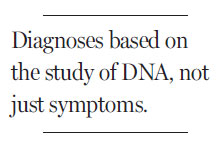Mental illnesses linked to genetic glitches
Updated: 2013-03-17 08:37
By Gina Kolata(The New York Times)
|
|||||||

The psychiatric illnesses seem very different - schizophrenia, bipolar disorder, autism, major depression and attention deficit hyperactivity disorder. Yet they share several genetic glitches that can nudge the brain along a path to mental illness, researchers report. Which disease, if any, develops is thought to depend on other genetic or environmental factors.
Their study, published in the Lancet, was based on genetic data from more than 60,000 people worldwide. Its authors say it is the largest genetic study yet of psychiatric disorders. The findings strengthen an emerging view of mental illness that aims to make diagnoses based on the genetic aberrations underlying diseases instead of the disease symptoms.
Two of the aberrations discovered were in genes used in a major signaling system in the brain, giving clues to processes that might go awry and suggestions of how to treat the diseases.
"What we identified here is probably just the tip of an iceberg," said Jordan Smoller, lead author and a professor of psychiatry at Harvard Medical School and Massachusetts General Hospital.
Steven McCarroll, director of genetics for the Stanley Center for Psychiatric Research at the Broad Institute of Harvard and Massachusetts Institute of Technology, said the study was significant. "It is very important that these were not just random hits on the dartboard of the genome," said Dr. McCarroll, who was not involved in the study.
In 2007, researchers began investigating genetic data generated by studies in 19 countries. They were looking for variations in any of several million places along the stretch of genetic material containing three billion DNA letters. The question: Did people with psychiatric illnesses tend to have a distinctive DNA pattern in any of those locations?
Researchers had already examined the genes of families in which psychiatric disorders seemed prevalent. They found a few unusual disruptions of chromosomes that were linked to psychiatric illnesses. But what surprised them was that while one person with the aberration might get one disorder, a relative with the same mutation got another.
Jonathan Sebat, chief of the Beyster Center for Molecular Genomics of Neuropsychiatric Diseases at the University of California, San Diego, and one of the discoverers of this effect, said that work on these rare genetic aberrations had opened his eyes. "Two different diagnoses can have the same genetic risk factor," he said.
The new study found four DNA regions that conferred a small risk of psychiatric disorders. For two of them, it is not clear what genes are involved or what they do, Dr. Smoller said. The other two involve genes that are part of calcium channels, used when neurons send signals in the brain.
"The calcium channel findings suggest that perhaps - and this is a big if - treatments to affect calcium channel functioning might have effects across a range of disorders," Dr. Smoller said.
Researchers had already postulated that drugs that block calcium channels, now used to treat high blood pressure, might be useful for bipolar disorder.
Dr. Roy Perlis of Massachusetts General Hospital has completed a study of a calcium channel blocker in 10 people with bipolar disorder. He wants to study the drug in people with schizophrenia, in light of the new findings.
He cautions, though, that people should not rush out to take a calcium channel blocker on their own. "We need to be sure it is safe," he said, "and we need to be sure it works."
The New York Times
(China Daily 03/17/2013 page11)